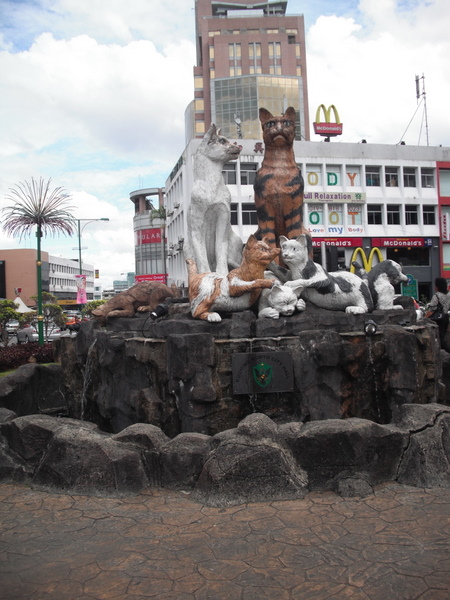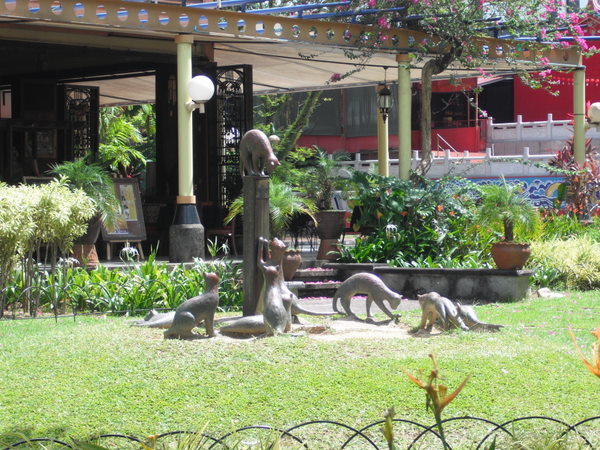Fun in Borneo: Kuching, city of cats – or is it ports?
It’s hard to know where to begin on our trip to Kuching, in Borneo. Maybe with basic geography; Borneo is a big island east of Singapore, that has several states in it, belonging to three different nations. There’s the Kingdom of Brunei, which used to own Kuching, the Malaysian states of Sabah and Sarawak, and the Indonesian state of Kalimantan. Got that?
The city Kuching is the capital city of Sarawak, the Malaysian state. Of course you know that Malaysia in its current form only dates back about 45 years; before that Sarawak belonged to the British, kind of. Somewhere between 1800 and 1830 a Brit who’d been brought up in India did the Sultan of Brunei some favors of a military nature, and in return he was rewarded with a kingdom – cool! He became the White Rajah of Kuching (a city whose name means “port” in various Indian languages) and ruled from a fort on the river. He brought in Chinese coolies to fell the ironwood trees that the Brits needed for their navy and to do various mining and other hard work. Missionaries came in and converted the many tribespeople in the rainforest (there are 27 ethnicities in Sarawak), so that the majority of the population is Christian. (The missionaries also discouraged headhunting – a policy that was reversed by the last White Rajah in 1942, after the Japanese invaded. “Go ahead and hunt heads!” he said, “as long as they are Japanese.” I am not sure how successful this method of warfare was.)
There were various attempts to revolt against British rule in Sarawak, by various ethnicities. The Dayaks mounted an armed rebellion, but their leader was killed. The Chinese coolies came close to toppling the White Rajah, but their rebellion was put down as well. The local Malay sultan, who’d effectively been usurped, plotted and fulminated for decades in various locations, but never did get around to an armed insurrection. I could be wrong, but this seems to me a typical pattern for Malays in power – lots of concern with honor and titles but not a lot of practical results.
Anyway, the place joined the current Muslim state of Malaysia, with a few stipulations; first, Sarawak and Penang are the only two Malaysian states ruled by governors, rather than sultans; second, Sarawak controls its own borders, so that even penninsular Malaysians going there have to have their passports stamped. Theoretically this allows Sarawak to keep from being overrun by Muslim Malays. BTW, the current governor of Sarawak has been in office for over 40 years, and is in his 70s, so in effect he IS the sultan. Like the prime minister of Italy, he seems to have an unusually vigorous interest in very young women.
Kuching is interesting in that it is a city with two mayors. North of the Sarawak River there’s the muslim Malay mayor, and south of the river there’s the Chinese mayor. Malaysia is a muslim state with sharia law courts, but muslims are the minority in Sarawak, so there are parallel legal systems for muslims and for everyone else. These cover everything from land ownership (only ethnic Malays can buy certain kinds of land) and restaurant inspection (halal rules for muslims). Very interesting, not least as a challenge in the daily lives of the citizens.
One side effect of Sarawak’s joining Malaysia is that the Bahasa Malay word “kuchin” means cat. So a whole tourism industry has arisen to take advantage of this – much as the Singapore tourism industry has created the Merlion as mascot of the city. Kuching has a lot of cat statues to visit.

A nicer one is this:

And there are various stories about cats being parachuted into the city to save the people there from a plague of rats – but no evidence or proper documentation of this whatsoever.